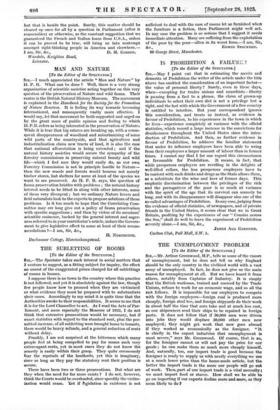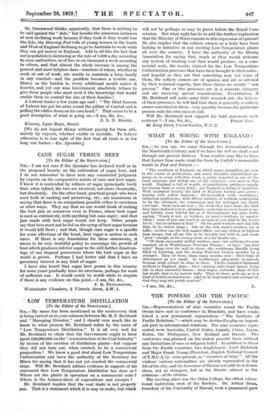THE UNEMPLOYMENT PROBLEM [To the Editor of the SPECTATOR.] Stn, —Mr.
Arthur Greenwood, M.P., tells us some of the causes of unemployment, but he does not tell us why England should be the only country in the civilized world with a vast army of unemployed. In fact, he does not give us the main reason for unemployment at all. But we have heard it from others, notably from Captains of Industry. It is simply that the British workman, trained and coerced by the Trade Unions, refuses to work for an economic wage, and so all the rest follows. It is impossible for our employers to compete with the foreign employers—foreign coal is produced more cheaply, foreign steel too, and foreign shipyards do their work in about half the time that ours take and at much less cost, so our shipowners send their ships to be repaired in foreign ports. It does not follow that if 50,000 men were driven into jobs they would displace 50,000 other men now employed ; they might get work that now goes abroad if they worked as economically as the foreigner. "It is chiefly in the export industries that unemployment is most severe," says Mr. Greenwood. Of course, that is so, for the foreigner cannot or will not pay the price for our goods.; he can make them so " much more cheaply himself. And, naturally, too, our import trade is good because the foreigner is ready to supply us with nearly everything we use at a much lower price than the home-made article, but the better the import trade is the more our people will go out of work. Then, part of our import trade is a vital necessity; we must import food or starve. How shall we be able to go on importing if our exports decline more and more, as they seem likely to do ? Mr. Greenwood thinks, apparently, that there is nothing to be said against the " dole," but besides the numerous instances of men declining work because if they took it they would lose the dole, the Morning Post tells of young women in the South and West of England declining to go to Australia to work while they can get money in England. Add to all this the fact that our population is increasing at the rate of 1,000 a day according to some authorities, or of five or six thousand a week according to others, and that almost the whole increase is among the poorest and most helpless elaqq—numbers of whom, whether in work or out of work, are unable to maintain a large family in any comfort—and the problem becomes a terrible one. Heavy as the burden is, every additional mouth makes it heavier, and yet our wise Government absolutely refuses to give these people who most need it the knowledge that would enable them to control the size of their families I
A Labour leader a few years ago said : " The blind Samson of Labour has got his arms round the pillars of Capital and is pulling the edifice down on his own head." That seems to be a good description of what is going on.—I am, Sir, &c.,
[We do not import things without paying for them ulti- mately by exports, whether visible or invisible. To believe otherwise is to lose sight of the fact that all trade is in the long run barter.—En. Spectator.]



















































 Previous page
Previous page